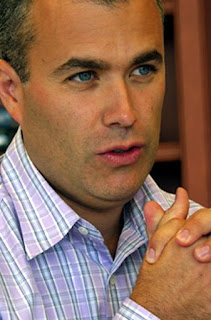Live Video Streams. Tuesday, March 24th, 5 p.m. PST / 8 p.m. EST, President Barack Obama will hold his second official, prime-time press conference. The president is likely to face question about the economy and foreign affairs. The press conference will be live on the network channels - ABC, NBC and CBS - and on cable news - C-SPAN CNN, MSNBC and Fox News.
CNN's player will attempt to open in a pop-up window, you may allow if your blocker does not allow. Turner media will ask you to install
Octoshape which is a P2P application that shifts the broadcaster's share of the cost of bandwidth to the listeners instead by running servers on the listeners' machines, which you may decline. CNN's live stream will then open a pretty nice player that will allow full screen viewing.
FILE TYPES: (as more types become available, wmv, ogg, mp3 for download and podcast, they will be posted here)
Full Press Conference Washington Post
Full Press Conference MSNBC
Transcript: President Obama's Press Conference
CQ Transcripts Wire
Tuesday, March 24, 2009; 9:20 PM
SPEAKER: PRESIDENT BARACK OBAMA
[*] OBAMA: Hello, everybody. Please have a seat.
Good evening. Now, before I take questions from the correspondents, I want to give everyone who's watching tonight an update on the steps we're taking to move this economy from recession to recovery, and ultimately to prosperity. Now, it's important to remember that this crisis didn't happen overnight and it didn't result from any one action or decision. It took many years and many failures to lead us here. And it will take many months and many different solutions to lead us out. There are no quick fixes, and there are no silver bullets.
That's why we've put in place a comprehensive strategy designed to attack this crisis on all fronts. It's a strategy to create jobs, to help responsible homeowners, to restart lending, and to grow our economy over the long term. And we're beginning to see signs of progress.
OBAMA: The first step we took was to pass a recovery plan to jump-start job creation and put money in people's pockets. This plan's already saved the jobs of teachers and police officers. It's creating construction jobs to rebuild roads and bridges.
And yesterday, I met with a man whose company is reopening a factory outside of Pittsburgh that's rehiring workers to build some of the most energy-efficient windows in the world.
And this plan will provide a tax cut to 95 percent of all working families that will appear in people's paychecks by April 1st.
The second step we took was to launch a plan to stabilize the housing market and help responsible homeowners stay in their homes. This plan's one reason that mortgage interest rates are now at near historic lows.
We've already seen a jump in refinancing of some mortgages, as homeowners take advantage of lower rates. And every American should know that up to 40 percent of all mortgages are now eligible for refinancing.
This is the equivalent of another tax cut, and we're also beginning to see signs of increased sales and stabilizing home prices for the first time in a very long time.
The third part of our strategy is to restart the flow of credit to families and businesses. To that end, we've launched a program designed to support the markets for more affordable auto loans, student loans, and small-business loans, a program that's already securitized more of this lending in the last week than in the last four months combined.
Yesterday, Secretary Geithner announced a new plan that will partner government resources with private investment to buy up the assets that are preventing our banks from lending money.
And we will continue to do whatever is necessary in the weeks ahead to ensure the banks Americans depend on have the money they need to lend, even if the economy gets worse.
Finally, the most critical part of our strategy is to ensure that we do not return to an economic cycle of bubble and bust in this country. We know that an economy built on reckless speculation, inflated home prices, and maxed-out credit cards does not create lasting wealth. It creates the illusion of prosperity, and it's endangered us all.
The budget I submitted to Congress will build our economic recovery on a stronger foundation so that we don't face another crisis like this 10 or 20 years from now.
We invest in the renewable sources of energy that will lead to new jobs, new businesses, and less dependence on foreign oil. We invest in our schools and our teachers, so that our children have the skills they need to compete with any workers in the world.
We invest in reform that will bring down the cost of health care for families, businesses and our government.
And in this budget, we have -- we have to make the tough choices necessary to cut our deficit in half by the end of my first term, even under the most pessimistic estimates.
OBAMA: At the end of the day, the best way to bring our deficit down in the long run is not with a budget that continues the very same policies that have led us to a narrow prosperity and massive debt. It's with a budget that leads to broad economic growth by moving from an era of borrow and spend to one where we save and invest.
And that's why clean energy jobs and businesses will do all across America. That's what a highly skilled workforce can do all across America. That's what an efficient health care system that controls costs and entitlements like Medicare and Medicaid will do.
That's why this budget is inseparable from this recovery: because it is what lays the foundation for a secure and lasting prosperity.
The road to that prosperity is still long, and we will hit our share of bumps and setbacks before it ends. But we must remember that we can get there if we travel that road as one nation, as one people.
You know, there was a lot of outrage and finger-pointing last week, and much of it is understandable. I'm as angry as anybody about those bonuses that went to some of the very same individuals who brought our financial system to its knees, partly because it's yet another symptom of the culture that led us to this point.
But one of the most important lessons to learn from this crisis is that our economy only works if we recognize that we're all in this together, that we all have responsibilities to each other and to our country.
Bankers and executives on Wall Street need to realize that enriching themselves on the taxpayers' dime is inexcusable, that the days of outsized rewards and reckless speculation that puts us all at risk have to be over.
At the same time, the rest of us can't afford to demonize every investor or entrepreneur who seeks to make a profit. That drive is what has always fueled our prosperity, and it is what will ultimately get these banks lending and our economy moving once more.
We'll recover from this recession, but it will take time, it will take patience, and it will take an understanding that, when we all work together, when each of us looks beyond our own short-term interest to the wider set of obligations we have towards each other, that's when we succeed, that's when we prosper, and that's what is needed right now. So let's look towards the future with a renewed sense of common purpose, a renewed determination, and, most importantly, renewed confidence that a better day will come.
All right. With that, let me take some questions. And I've got a list here.
Let's start off with Jennifer Loven, A.P.
FULL PRINT FRIENDLY TEXT TRANSCRIPT

















